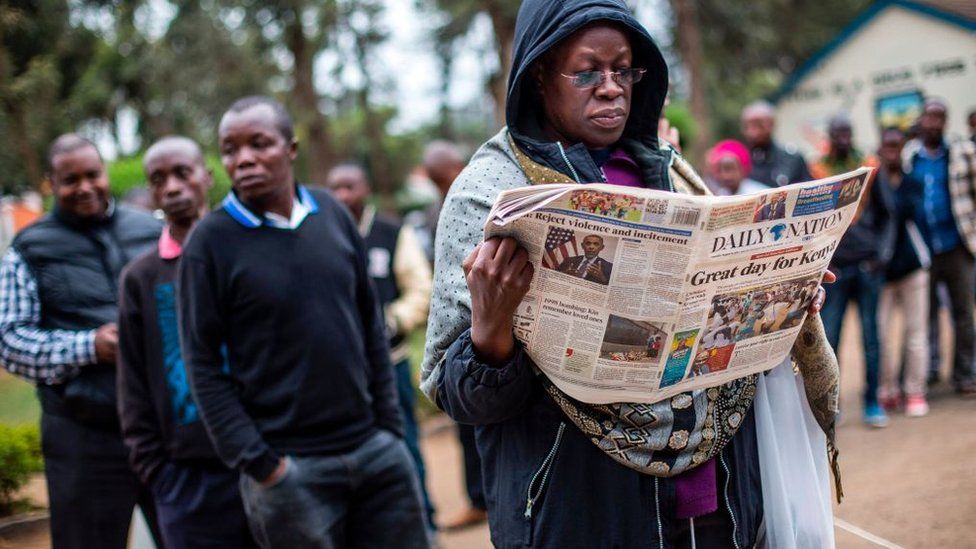Kenya columnists quit Nation Media Group over 'meddling'
- Published

Eight leading newspaper columnists have resigned from Kenya's largest media group, citing a "loss in editorial independence".
In a joint statement, they suggested government interference in the Nation Media Group (NMG).
NMG said it regretted the columnists' position and it believed in "independence, fairness and balance".
The resignations come at a time when the government has been accused of cracking down on the media.
In January, several of Kenya's most popular TV stations, including NMG-owned NTV, were pulled off-air for their planned coverage of the mock presidential inauguration of opposition leader Raila Odinga.
Mr Odinga rejected Mr Kenyatta's victory in elections, saying the poll was rigged.
In their resignation letter, the columnists protested against the firing of managing editor, Denis Galava, over an editorial critical of Uhuru Kenyatta's presidency, and the refusal to renew the contract of popular cartoonist Gado, who had previously taken aim at the government.
The resignations were clearly coordinated, and bring into question the editorial independence of NMG, including the Daily Nation, Kenya's biggest circulating newspaper, reports the BBC's Ferdinand Omondi from the capital, Nairobi.
For decades, the Daily Nation was hailed as an authoritative and truthful newspaper, but in the last few years several of its senior journalists have either been fired or have resigned after clashing with the government, he adds.
Those who quit include George Kegoro, executive director of the Kenyan Human Rights Commission; Lynne Muthoni Wanyeki, Africa director of the Open Society Foundation, Nic Cheeseman, professor of democracy at a UK university and Rasna Warah, an author.
"I resign to protest the growing infringement on media freedom. I resign to show solidarity with the voices that have been silenced. I resign because we must live our beliefs," Mr Cheeseman said.
The statement also alleged that the general manager of NTV station, Linus Kaikai, was fired by NMG after he "spoke of collusion between" the government and NMG's managers to censor the mock swearing-in of opposition leader Raila Odinga.
"A worrying pattern has emerged where it appears the executive government is able to influence who works for or contributes to NMG," the statement said.
"Censoring individual columnists signals official intolerance for dissenting views and suggests executive willingness to go to any length - even co-opting editors - to achieve its aims," it added.
In its response, the media group said it was founded on the "bedrock" of media freedom and editorial independence.
"We wish to reiterate that overall we have honoured our obligation to respect their views, and did not tamper with their positions except to correct basic errors," NMG said.
- Published3 February 2018
- Published27 November 2017
- Published22 August 2022